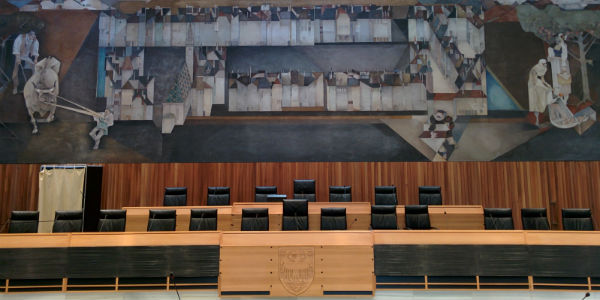Time to invite the ‘Others’ to the table: a proposal to make South Tyrol more inclusive
South Tyrol, an autonomous and predominantly German-speaking province in northern Italy, is regarded as one of the most successful cases of ‘consociational’ democracy – a political system in which people deeply divided along ethnic, linguistic, or other lines share power. One of the rights that speakers of German, Italian and Ladin living in the province enjoy is proportional representation in the Provincial and municipal executives. Stephen J. Larin and Marc Röggla argue that it is now time to include ‘Others’, who do not wish to formally identify with any or just one of these language groups, in that proportionality rule. Taking this step would help shift the province from corporate consociationalism towards a more liberal model.

The Dolomites, South Tyrol. Photo: Stephen Larin
South Tyrol (known as Südtirol in German and Alto Adige in Italian) was part of the Austro–Hungarian Empire until it was annexed by Italy at the end of the First World War. After a long and varying conflict between German- and Italian-speakers that included Fascist oppression, the flawed implementation of an autonomy agreement between Austria and Italy, and violent unrest, the 1972 Autonomy Statute successfully instituted territorial autonomy for the province and power-sharing between its three official language groups (German, Italian, and Ladin).
In an earlier post, we explained that South Tyrol recently began what has been billed as a participatory democratic process with the aim of amending the Autonomy Statute. We argued that the ‘South Tyrol Autonomy Convention’ does not represent a new type of consociational negotiation but its occurrence and even its problems may be evidence that power-sharing can transform conflicts.
Now we propose to build on that success and genuinely bolster South Tyrol’s liberal–democratic legitimacy by amending the Autonomy Statue to include ‘Others’ – the Province’s official designation for people who do not want to declare membership of one of its three official language groups – in the executive proportionality rule, and adjust the reservation of the Provincial Council’s two Vice President positions so that an ‘Other’ could hold one of them.
These changes would shift South Tyrol from ‘corporate’ towards ‘liberal’ consociationalism – making it more liberal and democratic without jeopardising the necessary protections that have made progress possible – and it would only have an effect if that is what the people of South Tyrol want.
Corporate and liberal consociationalism
‘Consociationalism’ is a set of institutions and measures that formalise power-sharing between two or more social segments of a divided territory. It can be either ‘corporate’ or ‘liberal’. A corporate consociation names the segments that will share power in the peace agreement or constitution that institutes it: in Belgium, for example, the federal executive must be composed of an equal number of Dutch- and French-speakers.
A liberal consociation, on the other hand, institutes a power-sharing framework but determines who will share power within that framework democratically. Northern Ireland, for example, uses the mathematical ‘D’Hondt method’ to determine the proportional distribution of executive positions based on the number of seats each party wins in the election, regardless of group affiliation.
A recent study by Allison McCulloch found that of the twelve contemporary consociations, five are corporate, three are liberal (only one by design), and four are mixed systems. Corporate and mixed consociational agreements are more common, she explains, because such
“settlements are negotiated at the very point at which group identities are the most politically salient and polarised. Under conditions of insecurity, groups and their representatives are unlikely to settle for anything other than a strong guarantee of their share of power, regardless of electoral prospects.”
Nevertheless, most advocates of consociationalism strongly prefer the liberal version. As John McGarry and Brendan O’Leary persuasively put it, liberal consociational arrangements are preferable because
“national identities in pluri-national places are not permanently fixed, and not everyone adheres to them—or with equal intensity if they do. A liberal consociation should treat as equally as possible those individuals who subscribe to rival national identities, to no national identity, to nested national identities, or have other salient public identities which cross-cut national lines.”
In short, liberal consociationalism tries to balance the pragmatism of formal power-sharing in a divided territory with the principles of liberal–democratic freedom and equality.
A proposal for South Tyrol
South Tyrol’s consociational measures are corporate: power is shared by the three official language groups (German, Italian, and Ladin) through a mix of reserved and proportionally distributed positions. This makes sense given the power imbalance and antipathy between German- and Italian speakers in the late 1960s and early 1970s, when the current Autonomy Statue was negotiated.
Things have changed since then. As we argued in our previous post, South Tyrol is still divided, but the mistrust that characterised the relationship between the German and Italian speakers is in the past for most people. This stability provides an opportunity to shift South Tyrol from a corporate to a mixed consociation by introducing some liberal measures. We think that the best way to do that at this juncture is to make ‘Other’, a category that was added to the language declaration 25 years ago, politically meaningful.
The Autonomy Statute requires proportional representation of South Tyrol’s three official language groups in its Provincial executive, municipal executives, and for public service employees.
At the Provincial level, the executive is composed of one President, two Vice Presidents, and a varying number of Ministers (currently five), elected by the Provincial Council through majority vote. The President can be affiliated with any group, but one Vice President must be a German speaker and the other an Italian speaker. The executive as a whole must reflect the proportion of official language groups represented in the Council, with the one exception that a Ladin-speaker may be included even if this derogates from proportional representation.
Municipal executives must also be proportionate to the linguistic composition of their Municipal Councils. Instead of a President and Vice Presidents, however, there is a Mayor and a Deputy Mayor. In municipalities with more than 13,000 inhabitants (currently six), the Deputy Mayor must be affiliated with the second-most represented official language group in the Council.
Executive proportionality was first implemented in the 1973 Provincial election, with candidates simply stating their group membership. Proportionality among public service employees was implemented in 1976, along with the requirement that all Italian citizens in South Tyrol declare themselves members of one of the three official language groups in the decennial census, starting in 1981.
An association of ‘mixed-language’ families (which included both migrants and families that speak at least two of the official languages) challenged the legality of the declaration requirement on the grounds that it discriminates against people who do not identify with one or only one of those groups.
In 1984, Italy’s Council of State ruled that while citizens in South Tyrol can be required to declare membership in an official language group in order to facilitate the implementation of the Autonomy Statute, they cannot be required to make a false declaration, so persons who do not belong to one of the three official groups must have another option.
In response, the Province added ‘Other’ as a declaration option, starting with the 1991 census, which requires those who choose it to also declare their ‘affiliation’ with one of the three official language groups in order to maintain the institutional function of the declaration. As a result, declaring oneself ‘Other’ is only symbolic and has no practical effect, which may be why so few people have chosen this option and the number has decreased over time: 2.39 per cent (10,095) in 1991, 2.24 per cent (9,587) in 2001, and 1.68 per cent (7,625) in 2011.
Notably, however, 3.6 per cent of those surveyed in 2014 identified as ‘Other’ (double the number in the census just three years earlier), and identifications not directly associated with the three official language groups figured prominently: 17.2 per cent European and 11.3 per cent ‘citizen of the world’ (it is important to note, however, that respondents could choose more than one answer). Furthermore, migration to South Tyrol has increased significantly over the past 20 years, and now 8.9 per cent of the population is foreign-born.
With these things in mind, we propose to amend the executive proportionality rule to include ‘Others’, and adjust the reservation of the Provincial Council’s two Vice-President positions from specific groups (one German and one Italian speaker) to members of the first and the second most-represented official categories in the Council, following the municipal Deputy Mayor model.
This means that the Provincial and municipal executives would be required to include ‘Others’ in proportion to their representation in their respective Councils, and it would be possible for a member of any of the four categories (German, Italian, Ladin speakers, and ‘Others’) to be one of the Provincial Vice Presidents. These amendments are intended to make political representation in South Tyrol more liberal democratic.
Consociational democracy is a pragmatic response to circumstances where majoritarian democracy would effectively institutionalise the dominance of one group over others. In many cases, this means that power-sharing between specific segments of a divided territory must be guaranteed in order to achieve stability. This kind of pre-determination constrains liberal democracy, however, and should be avoided when possible.
Making ‘Other’ a politically meaningful category is a way to empower people who do not identify with any or only one of the official language groups without jeopardising the stability won through consociation. And the fact that anyone can be an ‘Other’ would significantly improve the system’s liberal democratic legitimacy.
How would this proposal affect South Tyrol’s autonomy arrangement?
It is important to emphasise that these amendments leave almost all of the autonomy arrangement’s group protections intact, and only affect the composition of the Provincial and municipal executives. We cannot explain these institutions in detail here, but mention them briefly in order to ensure that our intentions are clear (for an overview, see the Autonomy Arrangements in the World website).
The Joint Commission of Six, an inter-governmental and inter-group institution that is charged with implementing the Autonomy Statute, will keep its equal seat reservations because the autonomy arrangement is still fundamentally an agreement between a national minority (German speakers in South Tyrol) and the national majority (Italian speakers throughout Italy). Public service employment will remain proportionate to language affiliation. And the public culture of each of the three language groups will remain protected through mandatory multilingualism in public services, and cultural autonomy supported with funding proportionate to language affiliation.
‘Others’ will also still be required to anonymously declare affiliation with one of the official linguistic groups in the census, and to make a personal declaration to be considered for positions allocated by linguistic affiliation, such as people working in public services. They will not be required to declare a language affiliation in order to run for elected office, but must do so to invoke the ‘group right to challenge’.

The South Tyrol Provincial Council. Photo: Stephen Larin
This right allows each of the three official language groups to challenge a bill, budget item, or administrative act that it deems prejudicial to its rights as a group. ‘Others’ will still be able to initiate a challenge if they have declared an affiliation, but the threshold for a challenge to move forward – a majority vote among the group’s Provincial Councillors – will only apply to Councillors who have declared themselves members rather than affiliates. In other words, ‘Others’ will be able to initiate but not block challenges within their affiliated group.
The reasons for this are more straightforward than the details: ‘Others’ of whatever political identity may still have an interest in protecting a particular public culture, but at the same time the right to challenge should favour those who identify as members of the three official groups that the system is designed to protect.
None of this means that we think that the amendments we have proposed are the only things that should change. We are, however, convinced that this is the extent of what is politically possible at this juncture, and we want to make the system more liberal-democratic with the knowledge that this could lead to further and better-legitimated changes in future if people desire them.
It is difficult to say what the results of the 2013 Provincial election would have been if the amendments that we are proposing had been in place. We do not know how many Provincial Councillors are ‘Others’, because only the declaration of affiliation is made public. Both politicians and voters may make different choices if ‘Other’ really means something, and you do not have to be an ‘Other’ yourself to vote for a party or candidate that is.
In Northern Ireland, where ‘Other’ has been a meaningful alternative to ‘Nationalist’ and ‘Unionist’ since the Good Friday Agreement of 1998, the electorate still mostly votes along ethno-national lines. ‘Others’ have never received more than 10 per cent of the vote, and have never held more than two of the ten executive positions at any given time. This is expected in divided territories, but building ‘Others’ into the system allows it to respond to political and social changes over time.
Even if it has no practical effect, however, there are good principled reasons to adopt this proposal.
First, a more liberal approach to consociationalism in South Tyrol would help address one of the most common criticisms of consociational democracy in general, which is that it seems to entrench the divisions that it is intended to address.
Second, making ‘Other’ a meaningful category may allow for a wider range of political perspectives to be represented in both Provincial and municipal governance.
And finally, it would bring South Tyrol closer to international human rights standards. This is also a practical consideration, given recent European Court of Human Rights rulings that some of Bosnia and Herzegovina’s corporate measures are illegitimately discriminatory (Sejdić and Finci v. BiH and Pilav v. BiH; for the problematic implications of this type of ruling for power-sharing agreements, see McCrudden and O’Leary 2013).
Conclusion
This proposal is a good fit for contemporary South Tyrol. The province has changed significantly since 1972, and we have a real opportunity to build on that progress by making it more democratic. It is far less divided than both Northern Ireland, where ‘Others’ already have access to the executive, and Bosnia and Herzegovina, where the exclusion of ‘Others’ has received significant international criticism.
It would also be straightforward to implement. Executive coalitions in South Tyrol are between language groups, not parties, meaning that one party could form the Provincial government on its own, so long as the declarations of its members on the executive are proportionate to the distribution of categories in the Council. But its greatest virtue is that it will only have an effect if ‘Others’ achieve electoral success because that is what people want.
This post represents the views of the authors and not those of Democratic Audit or EURAC.

 Stephen J. Larin (@sjlarin) (left) is a political scientist and Senior Researcher with the Institute for Minority Rights at the European Academy of Bozen/Bolzano (EURAC), Italy. His research focuses on the relationship between majority nationalism and minorities such as migrants and sub-state nations.
Stephen J. Larin (@sjlarin) (left) is a political scientist and Senior Researcher with the Institute for Minority Rights at the European Academy of Bozen/Bolzano (EURAC), Italy. His research focuses on the relationship between majority nationalism and minorities such as migrants and sub-state nations.
Marc Röggla (@MRggla) is a trained lawyer and Researcher with the Institute for Minority Rights at the European Academy of Bozen/Bolzano (EURAC), Italy. His research focuses on minority autonomy, protection, and media. He is one of two coordinators of EURAC’s administrative and advisory role in South Tyrol’s Autonomy Convention, and a EURAC representative in the European Association of Newspapers in Minority and Regional Languages (MIDAS).





 Democratic Audit's core funding is provided by the Joseph Rowntree Charitable Trust. Additional funding is provided by the London School of Economics.
Democratic Audit's core funding is provided by the Joseph Rowntree Charitable Trust. Additional funding is provided by the London School of Economics.
[…] Beitrag ist zuerst in englischer Sprache auf dem Democratic Audit Blog der London School of Economics erschienen. Er spiegelt die Ansichten der Autoren wieder, nicht die […]
Our most popular post this week | Time to invite the ‘Others’: a proposal to make South Tyrol more inclusive https://t.co/MT3IlkwvUk
Proportional representation by the single transferable vote has the flexibility to produce power-sharing. For instance in Northern Ireland, STV prevented the Nationalist vote being split between SDLP and Sinn Fein party lists, in the Ulster Euro-elections. STV allows voters to extend their preferences to freely prefered individual candidates of more than one party or social group. STV gives proportional representation of all social groups, as in the UK NHS, which proportionally represents women, immigrants and specialists. Previously FPTP elected all white male GPs.
In short, the power of transferable voting makes possible unity in diversity, in all conceivable social scenarios. Whereas party list PR rigidly privileges party divisions for a proportional count.
Richard Lung.
Website: Democracy Science; 3 free e-books on election method: Peace-making Power-sharing; Scientific Method of Elections; Science is Ethics as Electics.
.@sjlarin and @MRggla put forward an interesting proposal to make South Tyrol more inclusive @democraticaudit https://t.co/pazE4AV1m7
ICYMI: @MRggla and I follow our @LSEEuroppblog post with a proposal to amend #SouthTyrol’s ASt on @democraticaudit
https://t.co/VExxTyx37H
Time to invite the ‘Others’ to the table: a proposal to make South Tyrol more inclusive https://t.co/FUqDvidzZB
Time to invite the ‘Others’ to the table: a proposal to make South Tyrol more inclusive https://t.co/XwPDOmLaw8
NEW: @MRggla and I propose to include ‘Others’ in #SouthTyrol’s executive proportionality rule
@democraticaudit https://t.co/PCYa2XS5FY
Time to invite the ‘Others’ to the table: a proposal to make South Tyrol more inclusive https://t.co/MT3IlkeV2M
Time to invite the ‘Others’ to the table: a proposal to make South Tyrol more inclusive https://t.co/MT3IlkwvUk https://t.co/84PzoOvWM2